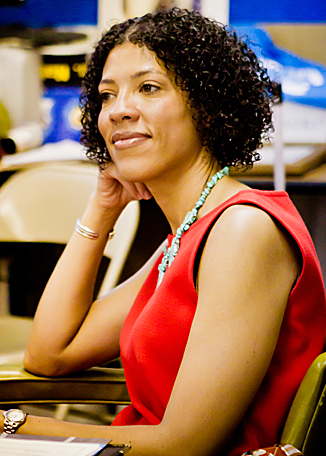
As an undergraduate student leader, Amy Locklear Hertel advocated for the creation of a center for American Indian students at the University of North Carolina. Seventeen years later — with two graduate degrees from Washington University and her doctoral dissertation in social work under way — Hertel returned to Chapel Hill in 2012 as director of the American Indian Center at the University of North Carolina at Chapel Hill.
“I’ve got both feet on the ground now in North Carolina, and one arm still back at Wash. U.,” Hertel says.
The appointment brought her back to her home state and the ancestral homes of the Lumbee and Coharie tribes, to which she belongs. The center, which works with the state’s eight Indian tribes and four urban Indian organizations, recently established the North Carolina Native Asset Coalition, which builds on Hertel’s scholarly work in St. Louis.
The coalition’s first project involves land acquisition, land management and development of a land-use plan to promote sustainability. Her doctoral dissertation, meanwhile, will explore the issue of asset building within the American Indian community, where savings traditionally takes on a more holistic perspective, with individuals generally more concerned with raising the well-being of the entire community than growing their own savings accounts.
“Savings in the native community is more community-based, rather than individualistic,” says Hertel, who grew up in Fayetteville, N.C., halfway between the Coharie and Lumbee communities that her family visited often. “Wealth is an aspect of that, but not everything.”
Hertel views social work through what she calls the “macro approach” — working on social and economic development to bolster her community’s well-being, which will improve the lives of its people.
In St. Louis, Hertel is in the final stages of an educational journey that began in 1997, when she arrived to seek a master’s degree at the Brown School. After graduating from UNC, Hertel’s heart was set on learning skills she could bring back to her community. She was attracted to St. Louis by Brown’s Kathryn M. Buder Center for American Indian Studies. Closing the deal was the full scholarship offered by the Kathryn M. Buder Foundation, on whose board she now sits.
Hertel views social work through what she calls the “macro approach” — working on social and economic development to bolster her community’s well-being, which will improve the lives of its people. While seeking her master’s degree in social work, she had an internship in Washington, D.C., at the U.S. Department of Treasury’s Office of the Comptroller of the Currency. There, she worked on issues involved in the oversight of banks on Indian reservations or in nearby communities.
While in D.C., she realized that she needed to broaden her skill set to make the kind of impact she envisioned. Hertel decided to become an attorney as well.
By 2002, she had earned her JD from the Washington University School of Law. She practiced law for two years at the St. Louis firm of Gallup, Johnson & Neuman, then worked for three years as in-house counsel at Ralcorp Holdings Inc., the nation’s largest producer of private-label foods.
“I needed to understand the practice of law in mainstream society before I took it home,” she says.
By 2008 Hertel was back on campus, building the knowledge base to take back home to the American Indians of North Carolina.
“Her professional training in law and social work, combined with her doctoral training in research, combine for an exceptional range of both skill and vision.”
— Michael Sherraden, PhD
But before that would occur, the university beckoned once more. She received a call from Michael Sherraden, PhD, the Benjamin E. Youngdahl Professor of Social Development in the Brown School and founding director of its Center for Social Development. Sherraden, one of the world’s foremost authorities on asset building, wondered if Hertel was interested in becoming a research manager at the Buder Center for a project regarding a Wisconsin tribe. Perhaps she would consider pursuing her doctorate.
By 2008 Hertel was back on campus, building the knowledge base to take back home to the American Indians of North Carolina.
“Her professional training in law and social work, combined with her doctoral training in research, combine for an exceptional range of both skill and vision,” Sherraden says. “Her colleagues instinctively trust her. They look to her for direction.”
David McKay Wilson is a freelance writer based in Mahopac, N.Y.

Comments and respectful dialogue are encouraged, but content will be moderated. Please, no personal attacks, obscenity or profanity, selling of commercial products, or endorsements of political candidates or positions. We reserve the right to remove any inappropriate comments. We also cannot address individual medical concerns or provide medical advice in this forum.